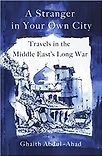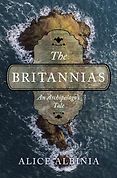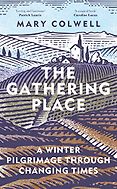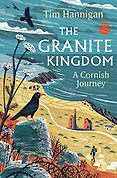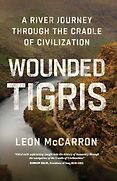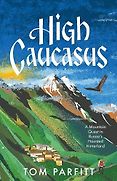As a judge for the 2024 Edward Stanford Travel Writing Awards you’re in an excellent position to advise us on whether it has been a good year for travel books.
Yes, I think it has been a very good year for travel writing, as illustrated by the books on the shortlist. One of the great pleasures of being on the judging panel is that you get to read so widely. The finalists cover an incredibly diverse range of topics, places, perspectives and voices, which is wonderful. Their books took me along the Tigris and the Camino de Santiago, across the Caucasus and the British Isles, and under the skin of places as disparate as Cornwall and Iraq. And, like all the best travel books, they shifted my view of the world in different ways.
What does it mean to an author, to be shortlisted for an award like this?
Obviously, it’s very gratifying. While awards aren’t everything, of course, it was a real joy for me last year to be shortlisted. My book, Crossed Off the Map, came from a tiny independent publisher, Latin America Bureau, so it was a big achievement from that point of view, too.
And on a personal level, I’ve been going to Stanfords bookshop all my life. Before I became a travel writer, my backpacking trips around India, Southeast Asia and South America started by looking through the guidebooks, travel literature and maps in Stanfords. When my first book came out, it was such a joy to see it on the shelves there.
“Travel writing is…a capacious genre. There are lots of different elements you can bring in”
On a practical level, being shortlisted for a literary prize such as this one raises your profile and brings the book to new audiences. Hopefully, that will also be the case for the authors on this year’s shortlist.
Well, let’s have a look at them. We can start with A Stranger in Your Own City: Travels in the Middle East’s Long War by Ghaith Abdul-Ahad. He’s an award-winning Iraqi reporter; that makes for an unusual spin on ‘travel writing.’
Ghaith Abdul-Ahad reported extensively for The Guardian and The Washington Post after the US invasion of Iraq and I remember reading his dispatches at the time and in the years since. Published on the 20th anniversary of the invasion, his book combines journalism, memoir and travel writing to tell the stories of the people caught up in the maelstrom as, to quote the author, ‘their world fragmented.’
One of the things about this book that really stood out to me was how it gives, vitally, an Iraqi-centred account. I felt that I was getting a 360º perspective of the situation, rather than stereotypes. It’s a powerful book.
Travel writing tends to be written from an outsider’s gaze, but as this book’s title suggests, his home place has changed so much it now feels foreign.
I think it reflects his sense of seeing his country change so dramatically over such a short period of time to the extent that he can feel lost in places that were once familiar. In many ways, he was perfectly placed to navigate what is obviously an incredibly difficult and dangerous situation, somethinng that he has experienced first hand.
It was different to other books that I’ve read on the conflict and I really enjoyed his perspective. It’s a hard-hitting book, so perhaps I shouldn’t say ‘enjoy’—it’s a tough subject matter, to state the obvious. But it is a powerful book that stays with you.
Our next book brings us a little closer to home—well, perhaps not for all of our readers. This is Alice Albinia’s The Britannias: An Archipelago’s Tale, which focuses on Britain’s islands.
The Britannias journeys from Neolithic ruins in Orkney, across the Isle of Wight, Iona, the Channel Islands and even Bermuda to present-day Thanet and Westminster, exploring the topography, stories, legends, ancient sites and forgotten characters of the British Isles. One of the things that stood out is that Alice Albinia goes beyond the well-worn, male-focused view of the past and highlights female histories that have been overlooked or shut down.
I’d enjoyed her previous book, Empires of the Indus, so was particularly keen to read this one. From a writer’s point of view, she does an incredible amount of research and uses a huge array of sources: myths, poetry, Roman literature, newspapers, plus first-hand interviews and her own travels.
Right. And it too gestures towards this idea that travel might be within a nation one knows well.
Yes. It’s one of the themes that came out of the pandemic, which forced us all to look inwards and examine the areas we live in or that we think of as familiar. I know I certainly did that during the lockdown in 2020. It can be a rewarding and enlightening experience—I learned a huge amount about the history, culture, myths and legends of Britain from this book.
Shall we look at Mary Colwell’s new book The Gathering Place: A Winter Pilgrimage Through Changing Times next? Why did it make the 2024 shortlist of the best travel books?
Several of the books on the shortlist are centred around walks or hikes, including The Gathering Place, which traces Mary Colwell’s 500-mile solo pilgrimage along the Camino de Santiago. The author notes that this pilgrimage in particular, and pilgrimages in general, have always drawn people during times of strife and upheaval. Fittingly, she walked the Camino during the autumn/winter of 2020, still at the height of the pandemic.
I’ve read travel books written about the same period that either ignore or underplay the pandemic. In The Gathering Place, it’s present throughout and Colwell does a great job of finding parallels with plagues and epidemics from the past. This adds a rich texture to her journey, as she delves into the history, stories and characters associated with the Camino. She also blends in diary entries from her previous travels, while painting perceptive portraits of her fellow pilgrims.
She has a poetic touch and her enthusiasm for the subject really shines through.
I’ve noticed a trend in hiking memoirs in recent years. But I suppose journeys on foot have always served as a useful narrative thread for travel writing.
Absolutely. Classically, in a travelogue, a walk from point A to point B gives you a clear journey and structure to base the book around. The idea of pilgrimage—both religious and secular—seems to be a popular theme in travel writing right now. There are quite a few other books coming out on the subject over the coming months, such as On This Holy Island: A Modern Pilgrimage Across Britain by Oliver Smith and Wayfarer: Love, Loss and Life on Britain’s Ancient Paths by Phoebe Smith. So The Gathering Place feels like a timely book in that sense, too.
Let’s move on to The Granite Kingdom: A Cornish Journey by Tim Hannigan. Another British travel narrative.
Yes, and another walk. In this book, author Tim Hannigan hikes across Cornwall—where he was born and brought up—while examining its history, landscape and people. I really enjoyed his exploration of Cornish identity and, by extension, English and British identities, too. Another stand-out element is that he subverts cliches and tropes, which is always important for travel writers to do. There’s a particularly enlightening section on the subject of ‘Cornish wreckers’, for example.
Right. I’ve been interested in that subject since I read Bella Bathurst’s The Wreckers a few years back.
Hannigan is an experienced travel writer, and I really enjoyed how he turned the traveller’s gaze on his own homeland. His book feels like a very modern, self-aware piece of travel literature.
Another thing that stuck out to me was that he fully engaged with contemporary issues, most notably the housing crisis, which is particularly acute in Cornwall and something indelibly linked to tourism. It’s an evocative and insightful book.
Perhaps we could look at Wounded Tigris next? Why did this travel book by Leon McCarron make the 2024 shortlist?
It was fascinating to read this book alongside A Stranger in Your Own City—they make excellent companion pieces. Wounded Tigris is a river journey along the length of the Tigris, from its source in the Turkish mountains, across northern Syria and through Iraq.
The author, Leon McCarron, is a writer and filmmaker who was based in Iraq at the time of the research. In many ways, it’s a classic-style travelogue: it has a well-paced narrative and McCarron is an empathetic writer who paints vivid and sympathetic portraits of the people he meets, as well as the river’s historical, cultural, political and economic significance. He also emphasised the immense environmental challenges it faces—it’s good to see a piece of travel writing fully engaging with the climate emergency. This is another book that will stay with you.
One theme that seems to be arising from this list is that travel writing seems to be increasingly politically engaged. Is that something you would agree with?
Yes. I think the idea of the travel writer as some kind of impartial ‘observer’ who is completely objective about the places he or she sees is thankfully being consigned to the past. Travel writers are on the frontlines of many of the touchstone issues of the 21st century. I’ve certainly found that in my own experience of writing about Latin America. In terms of the climate crisis, you have to wilfully ignore it for it not to be foregrounded in your work.
In Wounded Tigris, it’s very much at the forefront and McCarron clearly outlines the human impact. He shows that this is not something to think about in the future: this is happening to people now, and has been happening to them for many years.
So yes, it’s very welcome that travel writing is becoming increasingly politically engaged. Though, of course, travel writing has always been political, whether authors have acknowledged it or not.
Perhaps that might lead us nicely into a discussion of Tom Parfitt’s High Caucasus: A Mountain Quest in Russia’s Haunted Hinterland.
So this is another hike, and I think the longest one on the shortlist—a dramatic 1000-mile hike through the mountainous north Caucasus, passing through seven Russian republics from the Black Sea to the Caspian. One of the key elements of this book is that Tom Parfitt, a longtime newspaper correspondent in Moscow, deftly weaves in his own experiences, including the trauma of covering the 2004 Beslan school siege in which more than 300 hostages died.
On the hike he also explores the region’s landscapes, peoples, cultures and extremely turbulent history. It was a journey he did some years ago, but the book feels very topical as there are obviously some striking parallels with the current situation in Ukraine.
As an author, he also has a crisp, engaging writing style, which I really enjoyed.
I find my appetite for and understanding of books is always amplified by my presence in the place where they are set.
Whenever I travel for work or pleasure, I always like to read local literature and travel writing about that place. It gives a different insight into the culture and history of the places you are experiencing.
I was lucky enough to read High Caucasus while I was travelling through the Georgian side of the Caucasus and I had a much richer experience as a result.
Right, it helps me understand what I’m looking at or experiencing. Perhaps I could close our conversation by asking whether, having read so many travel books recently, you are feeling optimistic about the state of travel writing in 2024?
Absolutely. The ‘death’ of travel writing has become its own trope, wheeled out every few years. But it’s one of the oldest forms of writing and there is always going to be a need for it. The books on this shortlist, and many others that have been released in recent years, show that travel writing is in a good state of health. And there are plenty of books coming out soon that I’m excited about too.
In recent years, we have started to see a diversification of travel writing. There are more authors from a broader range of backgrounds, and they are helping to reinvigorate the genre by bringing fresh perspectives and covering places, cultures and histories that have been overlooked or even actively suppressed.
One thing I love about travel writing is that it is a capacious genre. There are lots of different elements you can bring into it, whatever topic you want to cover or style you want to use. This year’s shortlists—not just for the Edward Stanford Travel Book of the Year, but also the Viking Award for Fiction with a Sense of Place and the Children’s Travel Book of the Year—really illustrate that. So, yes, I’m very positive about the future of travel writing.
Interview by Cal Flyn, Deputy Editor
March 20, 2024. Updated: December 19, 2024
Five Books aims to keep its book recommendations and interviews up to date. If you are the interviewee and would like to update your choice of books (or even just what you say about them) please email us at [email protected]
Five Books interviews are expensive to produce. If you've enjoyed this interview, please support us by donating a small amount.

